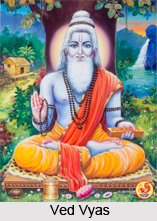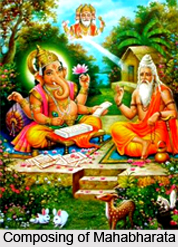 Ved Vyas was the first and greatest Acharya of Sanatan Dharma and the author of the great epic Mahabharata. He is responsible for classifying the 4 Vedas, wrote 18 Puranas and recited the great Mahabharata. In fact, the Mahabharata is often called as the 5th Veda. The most important and the most glorified section is the "Bhagwad Gita", the lesson recited to Arjuna by Lord Krishna on the battlefield. Apart from the Mahabharata, he also wrote the "Brahma Sutra", one of his shortest theologies on Hindu philosophy. It is said that Ved Vyas is immortal and he never died. The life of Ved Vyas is an example to all in the modern times on how to be selfless and devote oneself entirely to Lord in order to attain Nirvana.
Ved Vyas was the first and greatest Acharya of Sanatan Dharma and the author of the great epic Mahabharata. He is responsible for classifying the 4 Vedas, wrote 18 Puranas and recited the great Mahabharata. In fact, the Mahabharata is often called as the 5th Veda. The most important and the most glorified section is the "Bhagwad Gita", the lesson recited to Arjuna by Lord Krishna on the battlefield. Apart from the Mahabharata, he also wrote the "Brahma Sutra", one of his shortest theologies on Hindu philosophy. It is said that Ved Vyas is immortal and he never died. The life of Ved Vyas is an example to all in the modern times on how to be selfless and devote oneself entirely to Lord in order to attain Nirvana.
Personal Life of Maharshi Ved Vyas
Ved Vyas is also known as "Krishna Dvaipayana". Around some 5000 years ago, he was born on an island in the holy river Yamuna in Damauli of Tanahi district, which is presently in Nepal. His father was Rishi Parashar, a sage and his mother was Satyavati. He taught the Vedas to his pupils with ardent devotion and dedication. It is said that Mahabharata is the 18th Puran that was written by Ved Vyas. He fathered four famous sons, Pandu, Dhritarashtra, Vidur and Sukhdev. Ved Vyas received knowledge from great sages like Vasudeva and Sanakadik.
 Major Works of Ved Vyas
Major Works of Ved Vyas
Ved Vyasa is traditionally known as author of the Mahabharata in which he also played an important role. His mother later married the king of Hastinapura and had two sons. Both sons died without an issue and taking recourse to an ancient practice called "Niyoga" where a chosen man can father sons with the widow of a person who dies issueless. She requests Vyasa to produce sons on behalf of her dead son Vichitravirya. Vyasa fathers the prince Dhritarashtra by Ambika and Pandu by Ambalika, the wives of dead king. The sequence of events also leads to a 3rd son, Vidur by a serving maid to the queens. While these are legally not his sons, another son Shuka, born of a celestial nymph, is considered his true spiritual heir. He thus was the grandfather of both the warring parties of the Mahabharata, the Kauravas and the Pandavas. He serves as a spiritual guide to the young princes.
He asked Lord Ganesha to aid him in writing the Mahabharat. In the first book, it is stated that Ganesha imposed a condition that Vyasa narrate the story without pause and Vyasa made a counter-condition that Lord Ganesh understand the verse before he transcribed it.
In addition to the epic, he is also credited with the writing of the 18 major Puranas. His son Shuka Acharya is the narrator of the "Bhagavata Purana". The Brahma-Sutra is attributed to "Badarayana" which makes him the proponent of the crest-jewel school of Hindu philosophy, i.e., "Vedanta". As the island on which Vyasa was born is said to have been covered by Badara (Indian jujube) trees, he is known as "Badarayana".
Maharshi Ved Vyas in Buddhism
There is also mention of Ved Vyasa in Buddhism. In the two of their Jataka tales called "Kanha-Dipayana" and "Ghata". He appeared as a Bodhisattva in "Kanha-Dipayana", which has no connection with his Hindu Vedic works and in "Ghata Jataka" his role has a close relation to Mahabharata. In Ghata, the Vrishnis plays a joke on Ved Vyasa to put his clairvoyance powers to test. They dress up a boy as a woman by tying a pillow to his belly. Then they took him to Vyasa and asked him if he could tell them when the baby is due. He tells them that the person in front of him will give birth to a knot of Acacia wood and will destroy Vasudeva"s race. They killed him in the end but his divination came true.




















